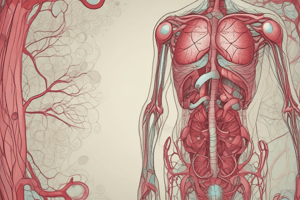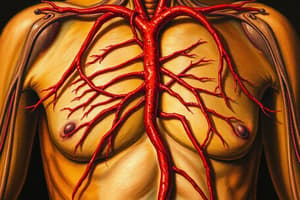Podcast
Questions and Answers
What is one primary advantage of a closed circulatory system?
What is one primary advantage of a closed circulatory system?
- It allows for maximum oxygen intake in the lungs.
- It minimizes the risk of blood clotting.
- It helps in the absorption of nutrients in the intestines.
- It facilitates faster blood circulation. (correct)
Which of the following is NOT a function of blood?
Which of the following is NOT a function of blood?
- Aid in digestion of food. (correct)
- Transport nutrients to tissues.
- Provide immunity against infections.
- Regulate body temperature.
Which characteristic distinguishes arteries from veins?
Which characteristic distinguishes arteries from veins?
- Arteries have valves while veins do not.
- Arteries contain lower pressure than veins.
- Arteries carry both oxygenated and deoxygenated blood.
- Arteries have thicker walls than veins. (correct)
What is the primary role of the pericardium?
What is the primary role of the pericardium?
Which of the following statements about the hepatic portal vein is correct?
Which of the following statements about the hepatic portal vein is correct?
What effect does smoking have on the cardiovascular system?
What effect does smoking have on the cardiovascular system?
What does a person's pulse signify?
What does a person's pulse signify?
Which statement correctly differentiates systole from diastole?
Which statement correctly differentiates systole from diastole?
What is an outcome of a double circulatory system?
What is an outcome of a double circulatory system?
What effect does a poor diet have on heart health?
What effect does a poor diet have on heart health?
Flashcards are hidden until you start studying
Study Notes
Advantages of a Closed Circulatory System
- Faster blood pumping allows for efficient nutrient and oxygen delivery.
- Blood flow can be regulated to specific organs, enhancing responsiveness to body needs.
Differences Between Arteries and Veins
- Arteries transport blood away from the heart while veins return blood to the heart.
- Blood pressure is high in arteries and low in veins; arteries have thick walls, and veins have thinner walls.
- Arteries possess small lumens which facilitate high pressure, whereas veins have larger lumens.
- Blood flow in arteries is pulsatile, while it is smooth in veins; valves are present in veins to prevent backflow.
Function of Valves
- Valves in veins and the heart prevent the backward flow of blood, ensuring unidirectional flow.
Advantages of a Double Circulatory System
- Maintains separation of oxygenated and deoxygenated blood, optimizing oxygen delivery.
- Supports higher blood pressure necessary for distribution throughout the body.
Exception to General Blood Flow
- The hepatic portal vein carries blood from the digestive organs to the liver instead of directly to the heart.
Functions of Blood
- Transports oxygen, nutrients, hormones, and waste products.
- Maintains homeostasis by regulating temperature and pH.
- Provides immunity against pathogens.
Protective Structure of the Heart
- The heart is encased in the pericardium, a tough protective sac that reduces friction during heartbeats.
Systole vs. Diastole
- Systole refers to the contraction phase of the heart chambers, pushing blood out.
- Diastole is the relaxation phase, allowing chambers to fill with blood.
Understanding Pulse
- Pulse is the rhythmic expansion and contraction of arterial walls in response to blood flow.
Effects of Smoking on the Heart
- Smoking elevates blood pressure and heart rate and decreases oxygen transport in the blood.
Impact of Diet on Heart Health
- Unhealthy diets can lead to blocked blood vessels; excessive salt can contribute to high blood pressure and increased heart rate.
Studying That Suits You
Use AI to generate personalized quizzes and flashcards to suit your learning preferences.



